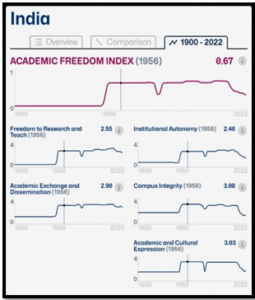THE DECLINING ROLE OF UNIVERSITIES IN INDIA
Syllabus – GS 2:
Development and Management of Social Sector/Health and Education Services.
News
- There are issues regarding academic freedom regarding the University Grants Commission’s (UGC) rule requiring universities to display government logos.
- This is part of a larger pattern of government interference in higher education, diminishing universities’ ability to serve as forums for independent discussion.
Examples of Attacks Against Academic Freedom:
- In the past, UGC has issued directives that have promoted political agendas, such as showing the Beti Bachao Beti Padhao logo;
- Previous mandates required institutions to participate in Swachhatha and G-20 awareness campaigns, among other things;
- The order to set up photo ops with the prime minister exemplifies the increasing politicization of academic environments;
- The current administration appears to use identical methods of repressing dissent; strangely, it is governed by persons who opposed the Emergency of the 1970s;
- Incidents such as IISc cancelling UAPA talks and JNU fines demonstrate efforts to restrict academic freedom;
- Scholars at Ashoka University have resigned as a result of political pressure, which highlights the culture of repression that exists there.
Declining Academic Freedom:
- India’s academic freedom index, as per the V-Dem Institute, places it in the bottom 30% globally;
- The score of 0.38 is lower than even Pakistan (0.43), reflecting a worrying decline compared to the Emergency years.
- India’s Performance Metrics:
- Campus Integrity: India records low scores;
- Institutional Autonomy: India’s performance is subpar;
- Academic and Cultural Expression: India fares poorly;
- Research and Teach, Academic Exchange: India performs slightly better;
- Such low rankings signal an alarming trend that threatens the core principles of democratic discourse.
About the 2022 Academic Freedom Index Report:
- This index is a global time-series dataset, published by the Global Public Policy Institute, spanning the years 1900 to 2019;
- Developed in collaboration with the V Dem Institute, Scholars at Risk, and Friedrich-Alexander University;
- Uses metrics such as research freedom, academic interchange, and institutional autonomy to evaluate academic freedom across 179 nations;
- Principal Indicators: The freedoms of research and teaching, academic exchange and dissemination, university institutional autonomy, campus integrity, and academic and cultural expression;
- Worldwide Overview:
Identifies 22 nations with lower levels of academic freedom, including Mexico, China, India, and the US. Out of 152 countries, only five made progress and went back to the levels of academic freedom that existed forty years ago.
Factors Contributing to India’s Decline:
- Significant decline since 2013, intensified post-2014 election.
- Lack of legal safeguards for academic freedom, enabling attacks.
- Pressure on institutional dimensions and constraints on academic freedom due to the ruling government’s policies.
Role of Universities in Democracy:
- Free Thought: They uphold the freedom of thought, encouraging diverse perspectives and fostering an environment for dissent and dialogue.
- Intellectual Hubs: Universities serve as intellectual hubs fostering critical thinking, innovation, and knowledge dissemination.
- Research and Awareness: Universities contribute to informed decision-making by conducting research, providing data, and raising societal awareness.
- Civic Engagement: Through education, they prepare individuals for active civic engagement, promoting democratic values and responsible citizenship.
- Social Equality: Universities play a role in addressing social inequalities by providing education as a means of empowerment.
- Policy Influence: Academic research and expertise influence policies, ensuring evidence-based governance.
- Global Citizenship: They cultivate a sense of global citizenship, promoting cross-cultural understanding and cooperation.
- Institutional Autonomy: Maintaining institutional autonomy safeguards universities as independent entities critical for a thriving democracy.
Challenges (to Institutional Autonomy):
- Unlike countries like New Zealand, India lacks explicit mention of academic freedom in its constitution.
- Freedom of speech, a constitutional guarantee, faces challenges through sedition laws, Section 295A, and defamation suits.
- Misuse of these legal provisions has become a tool to silence artists and scholars, limiting academic autonomy.
- The UGC’s increasing interference in university appointments and the erosion of institutional autonomy are detrimental.
- Politically motivated appointments compromise merit-based selections, impacting the overall quality of academic leadership.
Note: This contradicts the UGC Act of 1956, which emphasizes monitoring standards in consultation with universities.
Way Forward : Protecting Academic Freedom
- Legal Protection: Establish robust legal safeguards ensuring academic freedom, shielding scholars from interference.
- Institutional Independence: Safeguard university autonomy, minimizing political influence in leadership selection and decision-making.
- Global Collaboration: Foster international partnerships to bolster academic freedom globally.
- Public Awareness: Educate the public on academic freedom’s role in societal progress and democratic values.
- Faculty Contracts: Include explicit clauses protecting scholars’ academic freedom in employment contracts.
- Educational Modules: Integrate academic freedom education into curricula to emphasize diverse perspectives.
- Neutral Research Funding: Maintain impartial research funding to support unbiased investigations.
- Policy Advocacy: Advocate for policies that reinforce academic freedom, addressing legal gaps and preserving this fundamental principle.
As India commemorates its 75th year as a Republic, there’s a pressing need to reflect on the vision of Tagore for a nation “where the mind is without fear.”
Political parties should engage with faculty bodies and student associations to address the current state of academic freedom, ensuring universities remain bastions of free thought and expression.
Mains Practice Questions:
Analyse the worsening situation of academic freedom in India, with a focus on the recent UGC instruction and strategies for protecting academic freedom.




